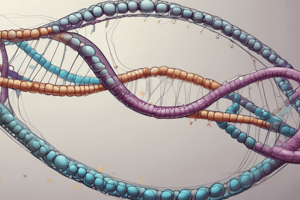Podcast
Questions and Answers
What is the role of epigenetic mechanisms in genetic expression?
What is the role of epigenetic mechanisms in genetic expression?
- They entirely change the DNA sequence.
- They are responsible for gene replication.
- They determine the overall number of chromosomes.
- They regulate which genes are activated or deactivated. (correct)
How does a parent's interaction with an offspring influence genetic expression?
How does a parent's interaction with an offspring influence genetic expression?
- It prevents any epigenetic changes from occurring.
- It solely changes the offspring's physical traits.
- It can activate epigenetic mechanisms that affect the offspring. (correct)
- It has no significant effect on genetic traits.
What do prenatal predictive-adaptive responses refer to?
What do prenatal predictive-adaptive responses refer to?
- The unborn child's reliance on external factors for survival.
- The fetus's ability to eliminate unnecessary genes.
- The fetus's capacity to predict future environmental conditions based on current cues. (correct)
- The genetic inheritance passed from father to offspring.
What is a characteristic of dominant-recessive inheritance?
What is a characteristic of dominant-recessive inheritance?
What distinguishes multifactorial inheritance from other inheritance patterns?
What distinguishes multifactorial inheritance from other inheritance patterns?
What is a significant strength of the psychoanalytic perspective in child development?
What is a significant strength of the psychoanalytic perspective in child development?
What is a notable weakness of the psychoanalytic theory as it pertains to child development?
What is a notable weakness of the psychoanalytic theory as it pertains to child development?
What does the humanistic perspective emphasize in relation to personal growth?
What does the humanistic perspective emphasize in relation to personal growth?
What is a primary strength of behaviorism according to the discussed theories?
What is a primary strength of behaviorism according to the discussed theories?
Which of the following is a notable weakness of Piagetian Theory of Cognitive Development?
Which of the following is a notable weakness of Piagetian Theory of Cognitive Development?
What does Vygotsky’s Sociocultural theory emphasize as crucial for cognitive development?
What does Vygotsky’s Sociocultural theory emphasize as crucial for cognitive development?
According to the information processing theory, which factor changes human cognitive functioning?
According to the information processing theory, which factor changes human cognitive functioning?
What is a significant limitation of Bandura’s Social-Cognitive theory?
What is a significant limitation of Bandura’s Social-Cognitive theory?
What is a primary strength of Bronfenbrenner’s Bioecological Theory?
What is a primary strength of Bronfenbrenner’s Bioecological Theory?
One weakness of learning theories is that they typically do not address which aspect of development?
One weakness of learning theories is that they typically do not address which aspect of development?
What is an inherent optimism found in strength-based approaches to development?
What is an inherent optimism found in strength-based approaches to development?
What aspect of human cognition does the information processing theory fail to provide?
What aspect of human cognition does the information processing theory fail to provide?
What is a significant weakness related to verbal instructions in Vygotsky’s theory?
What is a significant weakness related to verbal instructions in Vygotsky’s theory?
Flashcards are hidden until you start studying
Study Notes
Epigenetics and Gene Expression
- Epigenetic mechanisms regulate gene expression by signaling genes to activate or deactivate.
- Specific genes turn on to produce proteins necessary for cellular structure.
- Parental interactions can trigger epigenetic mechanisms that influence offspring development.
- Epigenetic changes in parents can be inherited by offspring.
- Fetuses adapt to environmental cues through prenatal predictive-adaptive responses, enhancing chances of survival.
Genetic Inheritance Patterns
- Dominance-Recessive: A dominant gene influences phenotype; two recessive genes are required for an associated trait.
- Polygenic Inheritance: Trait expression is controlled by multiple genes.
- Multifactorial Inheritance: Inheritance patterns are shaped by both genetic and environmental factors.
- Mitochondrial Inheritance: Mitochondrial DNA is inherited exclusively from the mother.
Psychoanalytic Perspective
- Development occurs due to internal drives and emotions affecting behavior (Sigmund Freud).
- Strength: Highlights the significant role of parents in shaping early childhood experiences.
- Weakness: Concepts are hard to measure and may not apply universally due to reliance on individual case studies.
Humanistic Approach
- Emphasizes innate goodness and personal growth potential for each individual.
- Strength: Focuses on individual choices rather than purely biological or societal forces; optimistic outlook on personal agency.
- Weakness: Concepts are not easily testable due to vague propositions.
Behaviorism
- Behavior is shaped by environmental conditioning, focusing on observable actions rather than internal mental processes.
- Strength: Learning theories effectively explain behaviors and their modifications through changing reinforcement systems.
- Weakness: Traditional behaviorism lacks a developmental perspective, offering little insight into lifespan changes.
Piagetian Theory of Cognitive Development
- Cognitive reasoning progresses through four universal stages from birth to adolescence, with unique cognitive schemes at each stage.
- Strength: Clarifies how children's thinking evolves with age.
- Weakness: The exact ages for skills development are often inaccurate, and may lead adults to underestimate children's abilities.
Information Processing Theory
- Cognitive functioning evolves through encoding, storage, and retrieval informed by brain maturation and practice.
- Strength: Aids in understanding how information management varies across different ages and individual differences.
- Weakness: The complexity of human information processing exceeds that of computers, failing to present a comprehensive developmental picture.
Vygotsky’s Sociocultural Theory
- Highlights the importance of social interactions in cognitive development through guided problem-solving during verbal exchanges.
- Strength: Emphasizes cultural context and social interaction in cognitive growth.
- Weakness: Verbal instructions may not benefit all cultural contexts.
Bandura’s Social-Cognitive Theory
- Learning occurs through observing models, influenced by personal cognitive development and situational interpretation.
- Strength: Explores the impact of models on behavior, integrating cognitive, emotional, social, and environmental factors.
- Weakness: Lacks a holistic view of development by downplaying biological influences.
Bronfenbrenner’s Bioecological Theory
- Development is shaped by the interplay of individual characteristics and contextual variables over time.
- Strength: Encourages research into the complex interactions of various influencing factors.
- Weakness: Minimizes the role of physical environmental factors like pollution, nutrition, and disease on development.
Studying That Suits You
Use AI to generate personalized quizzes and flashcards to suit your learning preferences.




